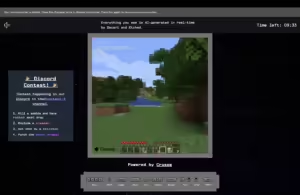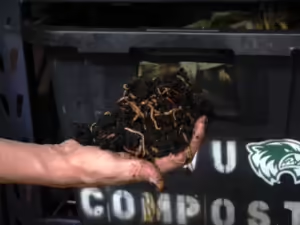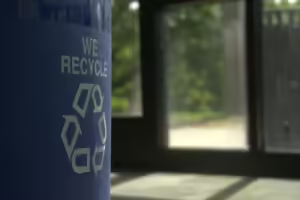On Oct. 28, 2024, at the Vallejo Auditorium in the Keller Building (KB). Four student researchers at Utah Valley University (UVU) presented their research from a collaborative study between The Center for National Security Studies (CNSS), The Herbert Institute and UVU’s Neuromarketing SMART Lab. The study’s aim was to monitor the effects of deepfake technology, and its ability to influence the public.
Students from the CNSS created deepfake video and audio samples to be viewed by people in the study. A total of 244 people participated in the study across the United States. 40 of them were tested in person, using the UVU SMART Lab Technology to collect biometric data such as eye-tracking and facial expressions. The other 204 participants participated online.
According to the research summary, “Participants had difficulty discerning whether the content they had viewed was real or AI generated. Over 50% of participants rated deepfake content as ‘probably real’ or ‘definitely real.’”
According to Muaricio Cornejo, a student researcher for the UVU SMARTLab, “What we found is that the deep fake video performed better in four out of the six metrics than the real video. It was perceived as more knowledgeable, as more trustworthy, as more persuasive, and of better content quality.”
What’s more, is that the participants whose biometrics were analyzed showed higher engagement and confusion when confronted with the AI generated media, suggesting a possible subconscious “uncanny valley” effect despite the higher engagement.
Hope Fager, senior analyst for UVU’s Emerging Tech Policy Lab, revealed that she and her team had created the deepfake videos which were used in the study on their own computers, better yet, Fager had created the deepfake video on her laptop for free:
“We tried a couple of different software methods in order to generate this video deepfake. And by far the best software available ended up being one that we found online, completely for free. I then trained the AI model on my laptop in a weekend by myself, completely in house.”
She makes a point that deepfakes are increasingly accessible and available to just about anybody. Acknowledging that the availability of deepfakes presents a new obstacle for policymakers and public servants to deal with.
Fager states: “The overall goal of this study is to give policymaker and campaigns the information they need to combat this issue effectively.”
Elections and misinformation

Considering the Presidential election, disinformation and misinformation have become an important point of discussion, with AI and deepfakes slowly becoming more prevalent in our media, as Silicon Valley pioneers the AI frontier.
Herbert research assistant, Will Freedman states that, “This is the first election cycle where AI content, namely deepfakes are projected to play a prominent role.” He then cites a daunting statistic with immense implications for how we look at online media: “From 2019 to 2023, the number of deepfakes online increased by 552%.”
Deidre Henderson, the Utah Lieutenant Governor spoke on the importance of unity, diligence, and faith in one another to defend the integrity of elections, stating, “Now we’re about to hear a report that I’m excited to hear on deepfakes, on AI, but I’m telling you, none of the tools may be different, the methods may be different, but the attempts to dissuade, the attempts to undermine the attempts to trick people. That’s nothing new, but it is something that we have to be continually vigilant and guard against.”
The presentation was immediately followed up with a panel, bringing in the opinions and voices of President Astrid S. Tuminez, the seventh President of UVU; Amelia Powers Gardner, Public servant with over 15 years of professional work across various fields; Michael Kaiser, the President and CEO of Defending Digital Campaigns (DDC); Brad Romney, COO of SureMark Digital; and Brandon Amacher, Director of the Emerging Tech Policy Lab for the I3SC and instructor for the UVU Center for National Security Studies.
Amacher summarized and discussed the findings of their research on deepfakes, noting that people do not have a more negative reaction to deep fakes compared to legitimate content. He explained, “The major findings that we found are essentially no it doesn’t. People do not have a more negative reaction to deep fakes than they do to legitimate content.”
He emphasized the importance of understanding how people encounter and react to misinformation in real-world scenarios, stating, “We want to replicate how people are going to encounter this type of information in the wild.” He also highlighted the need for further research, saying, “We see this as the first step to establish the foundation of quantifying the problem, but we think that there’s much more work to be done.”
When asked about election interference and how technology is plays a role into it, Kaiser states that:
“This is not some theoretical game or looking into theory. This is something that’s happening in our environment at this moment, and all of our awareness about this is really critical, and everybody should be on board and listening to these results.”
Kaiser emphasizes the importance of proactive measures and informing the public about deepfake technology. He claims that this technology can be used in cyberattacks, Russian misinformation and election persuasion and interference.
Kaiser states, “This is the time, if I’m trying to interfere with the election, is between now and next Tuesday, when everybody’s paying attention, when, when you can cement into someone’s mind a deepfake video that tells you something about a candidate or a policy that makes you want to act.”
Kaiser calls for a keen sense of skepticism among the public. He advocates for further introspection and critical thinking skills when evaluating media:
“I think this research actually reinforces that our ability to check and tell the difference cannot be what we base how we figure out whether deep fake not, right? It is going to be too good, and deepfakes are going to be normalized. People are going to use them for legitimate purposes, right? Not just illegitimate purposes. You have to check your own reaction.”
Gardner highlighted the significant impact of misinformation on election administration, recounting an incident during the 2020 presidential election where false information about a ballot drop box led to voter confusion and potentially suppressed votes. She emphasized, “Every vote that is counted affects the outcome of an election, but every vote that isn’t cast also affects the outcome of an election.”
Gardner stressed the importance of verifying information through reliable sources, advising voters to “go to the source. Go to your county clerk’s website.”
Romney took a similar stance, emphasizing the urgent need to address the decline in public trust in institutions, especially with the rise of AI-generated content. He noted, “We have seen, over the last several decades, the public trust in public institutions declining, and we’re at a very dangerous spot right now as AI comes into the picture.”
He stressed the importance of verifying the authenticity of digital content, stating, “We need to be able to trust the source” He highlighted SureMark’s efforts to provide digital solutions, explaining, “What we’ve done is we’ve made it so that anybody having a SureMark credential can use that to go and claim your content as well as the content that others create about you.”
The panel consensus was an acknowledgment of AI and its role in future online communications and public institutions. President Tuminez closed with a sentimental statement on the importance of voting and maintaining faith in democracy. “I couldn’t believe people peacefully ceded power. I’d never known that in my country.” Tuminez talked on her experience moving to America. She closed with a call to action for the students of UVU, stating “Our act of rebellion is to actually trust democracy, to register, to vote, and to actually participate in this wonderful democracy that we have.”










